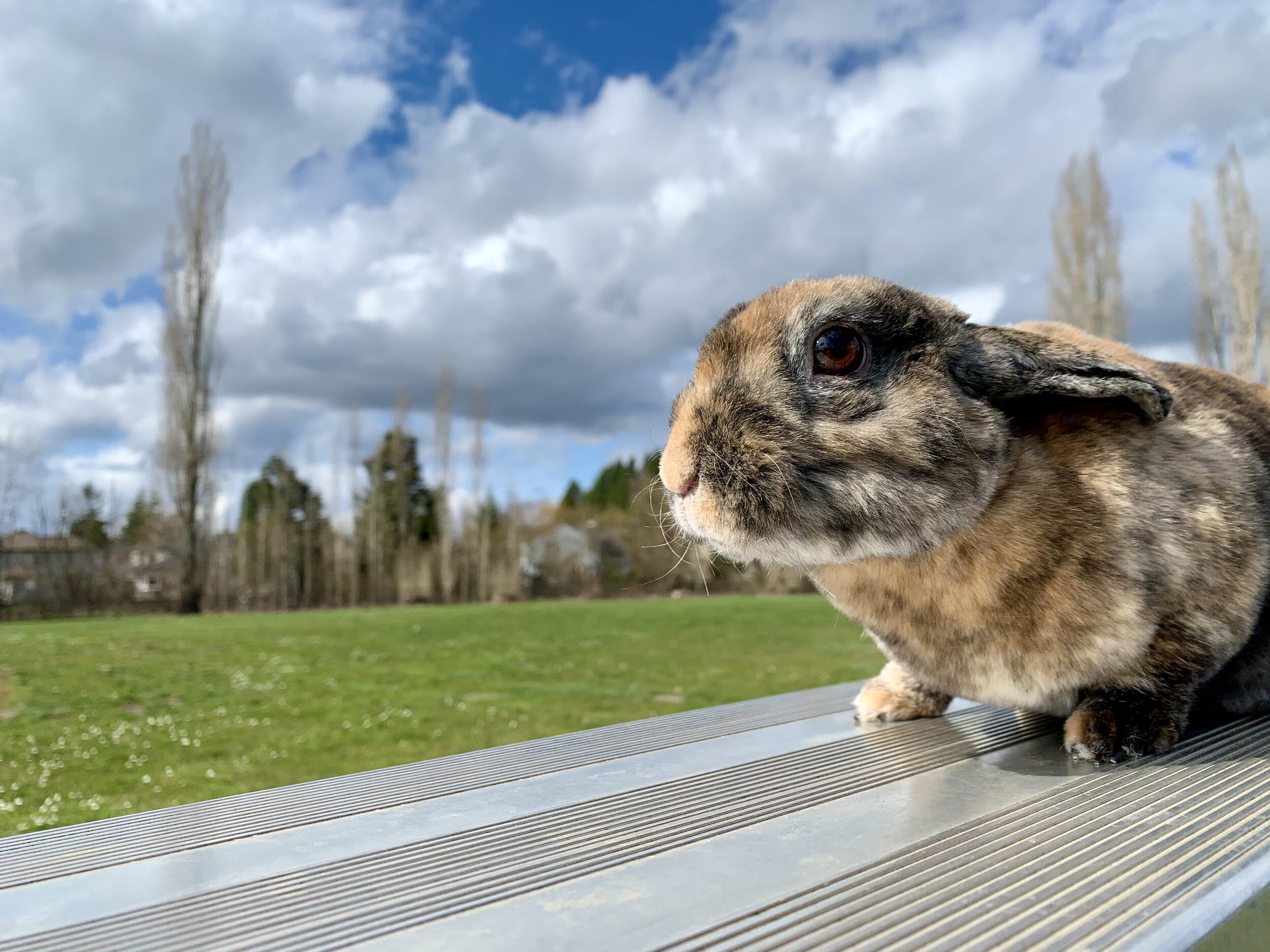
Found a
Pet Rabbit?
To report a domestic rabbit in need of rescue, please submit a Rescue Report.
Please include a photo and precise information on the bunny’s location in your report.
If you have already caught the bunny, please note this in your Rescue Report and review the “Resources” section of this website.
Rabbits in Crisis
Sadly, domesticated rabbits are abandoned every day in the Greater Portland Area. Rabbit Advocates is receiving an extremely large number of rescue reports and surrender requests each week. As a result of this surge, Rabbit Advocates may not be able to respond in a timely manner. We wish we could rescue every single rabbit in need, but we are an all-volunteer, non-profit organization. Rabbit Advocates can only rescue new bunnies if the organization has:
Appropriate quarantine locations, such as garages, to temporarily house newly-rescued rabbits while they are assessed, treated for fleas/mites, and determined to be free of RHDV2.
Certified indoor foster homes to care for the rabbit(s).
Sufficient funds for veterinary care including spay/neuter surgery.
Permission to go on property/properties where the rabbit(s) like to go.
If you submitted a Rescue Report and have not received a response, kindly check your spam folder first and then email rescue.rabbit@rabbitadvocates.org.
If you are trying to catch the rabbit(s) on your own, these resources from the House Rabbit Society, Rabbit Rescue Inc, Lennon the Bunny, Long Island Rabbit Rescue, and Ohio House Rabbit Rescue are helpful in planning your rescue. If you have rabbit(s) of your own, you should only attempt to handle unknown/stray rabbit(s) if your own rabbit(s) are vaccinated against RHDV2 and you can maintain proper biosecurity. Be aware that most rescues and shelters are chronically full and may not be able to provide help immediately or at all, and stray rabbits may be pregnant or nursing. Every rescue situation and stray bunny is unique, and rescuing abandoned bunnies can be time-consuming. The rabbits who are still alive outdoors on their own are smart survivors who will keep you on your toes. Here are a few of our favorite tips:
Essential Rules to Rabbit Rescue
Rule #1: Move calmly and slowly. Do not chase or run after the bunny; it scares the rabbit and makes them harder to catch. Live traps usually do not work and must be observed at all times or else bunnies can be actively harmed by the trap.
Rule #2: Food is your friend. Offering bunny-safe food is a great way to earn the trust of new lagomorph pals. If you plan to catch the bunny, be sure you have appropriate food since bunnies must eat high-fiber foods and drink water every few hours.
Rule #3: Pay close attention. Take photos and videos, and note where the bunny tends to play, rest, and go potty. Rabbits are usually most active at dawn and dusk, although abandoned domestic rabbits may alter their usual schedules to stay safe from predators and inclement weather.
Rule #4: Cut off potential escape routes. Using barriers, such as exercise pens, to block off areas or confine the rabbit(s) can be helpful. Rabbits will try to go through holes in the fence, burrow under decks, and dart under gates.
Rule #5: Check for medical concerns. If you’ve caught a stray rabbit and are concerned that s/he needs emergency medical attention, DoveLewis may be able to provide assistance.
Please note that Rabbit Advocates is not able to rescue wild rabbits. If you find a wild rabbit in need of care in the Portland area, please contact the Portland Audubon Society. There are additional licensed organizations who help Oregon wildlife and Washington wildlife under each state’s respective Departments of Fish & Wildlife.
If you have already rescued a rabbit, check out our Resources Section and be sure to review:
Diet: Bunnies must eat appropriate food every 6-8 hours (hay!), defecate, and urinate. Newly rescued rabbits found outdoors do not always eat enough hay at first. They have often adjusted to a mostly-fresh diet outside and may want a larger amount of non-gassy greens, like leaf lettuce and cilantro, in the first 1-2 weeks after rescue. Contrary to common belief, bunnies should not eat carrots except for an occasional dime-sized slice as a treat.
Housing: Temporary use of a dog crate or large cage in a garage or bathroom is sufficient to keep the bunny safe from other pets like dogs and cats. It is best to keep the bunny inside in a closed garage or even a shed while you work on a plan. Domesticated rabbits are not safe outside, and should not be in an outdoor enclosure or hutch. RHDV2 quarantines require the bunny to be off the streets for at least 2 weeks. If you have rabbit(s) of your own, do not allow them near the newly-caught rabbit(s) and practice proper biosecurity.
Vets: Check for medical issues, including insufficient eating and insufficient defecating/urinating. Many abandoned rabbits have not had a proper diet, and may be malnourished and/or dehydrated at the time of rescue. Minor wounds can be cleaned with human-safe simple saline solution or by gently using warm water on a paper towel. Neosporin without pain relief can be used on most wounds. Check for fleas (often hiding in the bunny’s neck area or hind quarters where bunnies can’t reach well), mites (can often see evidence in their ears), and dry/crusty/irritated/itchy skin. Kitten Revolution is the leading bunny-safe flea/mite treatment and it is only available by prescription from a veterinarian. If you’ve caught a stray rabbit in the Greater Portland, Oregon area who needs emergency medical attention, DoveLewis may be able to provide assistance.
